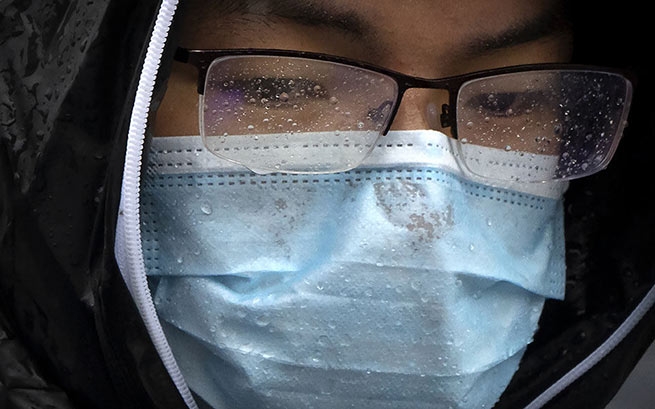People with long-term COVID-19 experience months or years of debilitating fatigue, mind-numbing brain fog, or a terrifying struggle to catch their breath.
But according to a new study, they can also face skepticism from others: employers and doctors question whether they are really sick, friends shun them, and relatives lose patience.
About 95% of people living with long-term COVID-19 say they have experienced at least one form of stigma, and three in four say they are “often” or “always” stigmatized because of their condition, the researchers report.
“Our findings suggest that long-term COVID is currently more stigmatized than many other long-term illnesses such as HIV and depression,” said lead researcher Maria Padelich, lecturer in public health at Brighton and Sussex Medical School in the UK. “Nearly all people living with long-term COVID-19 who participated in this study experienced some form of stigma associated with the disease.”
Long-term COVID-19 affects more than 30% of patients hospitalized with coronavirus, according to the US Centers for Disease Control and Prevention. The symptoms of long-term COVID-19 can be both discouraging and vague to the point of confusion, which can contribute to some skepticism, says Dr. Aaron Glatte, head of infectious diseases at Mount Sinai South Nassau Hospital.
“People might say, ‘Well, I had COVID-19 and I’m not sick. How are you, who had COVID-19, still sick? I don’t believe it.” Especially when the conclusions are not so specific, – says Glatte. – Someone has a broken arm, it’s quite obvious. Someone says: “I’m tired”, then everyone around says: “Okay, I tired too.”
To assess whether people with long-term COVID-19 are stigmatized for their condition, researchers polled more than 1,100 people online. The majority of participants (888) were from the UK, and about half of them had an official diagnosis of long-term COVID-19. Others said doctors suspected they had the syndrome but had not yet been officially diagnosed. Nearly two out of three (63%) patients with long-term COVID-19 said they faced direct discrimination because of their condition, the study found. They even said that people treated them like they were lying about the severity of their symptoms, treated them with disrespect and rudeness, or began to shun them.
“While we see that stigma seems to be everywhere,” Padelich said. “People living with long-term COVID are reporting that they are losing friends because of it, they are being fired by healthcare workers and they are losing their jobs because of it.” About 91% said they expected to face stigma at some point due to long-term symptoms, and another 86% said they felt a deep sense of shame associated with their condition. Individuals with a clinical diagnosis of long-term COVID-19 were more likely to report something similar compared to those without a diagnosis – 83% vs 69%.
As a result of this stigma, patients with long-term COVID-19 have reported keeping their mouths shut about their condition. About 61% said they were very careful about who they talked about their condition with, and 34% said they regretted talking about it.
The results of the study were recently published in the journal PLOS ONE. The stigma that accompanies the long course of COVID is not something that is seen only in the UK, says infection specialist Dr Louis Ostrosky. He is the chief infectious disease specialist at UTHealth Houston and Memorial Hermann Hospital and works at the hospital’s clinic that manages these cases. “That’s what I regularly hear from my patients,” Ostrosky said. “They feel stigmatized for prolonged COVID.”
Unfortunately, doctors encourage this because of the way they treat people with depression or chronic fatigue. “Patients go from doctor to doctor because they are not considered to be experiencing these symptoms,” Ostrosky said. “They are not familiar with the disease, so they don’t know about it and don’t know how to diagnose or treat it. Many cases are misclassified like mental illness.”
The stigma attached to patients around COVID comes from many other sources, Ostrosky said. “We have certain jobs where they are constantly required to document that they are almost incapacitated, which is what happens to some of our patients,” Ostrosky said. “We constantly have to justify treatment to insurance companies that question the diagnosis. Even spouses sometimes get upset because they don’t understand what’s going on. Most spouses are very supportive of each other, but at some point they unfairly suspect that the patient is faking an illness, and then problems arise in the marriage.”
Fatigue is one of the most common long-term symptoms that is questioned by others, although it can be “very deep and cause impotence,” according to Ostrosky. Another symptom is discomfort after exercise, “when people feel better and are engaged in some business or activity, and then feel deeply tired for the next two to three days.” Many also raise their eyebrows at the “famous” symptom described as “fog in the head”which prevents a person from concentrating or makes them slower in their movements.
People with long-term COVID-19 can directly combat this stigma by fully documenting their condition, says Glatt. According to experts, better awareness of the population will also contribute to this. “We desperately need clear messages that long-term COVID exists and that it can happen to anyone,” Padelich said. “This is not a disease of the weak or stressed.”







More Stories
Shocking report from Japanese scientists: “Cancer deaths increase sharply after mass Covid vaccination”
Study: Scientists have discovered why children are more susceptible to coronavirus
22 arrests and confiscations took place in Italy and other EU countries in the case of "covid" EU funds (video)